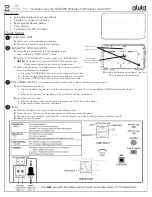
Recording Your Performance
P-85
Owner’s Manual
ENGLISH
23
Recording Your Performance
The ability to record and play back what you’ve played on the P-85 keyboard can be an effective
practice aid.
The P-85’s Song Recorder allows the recording of one User song.
Recording a performance
1.
Make all the initial settings.
Before you begin to record, select the voice you want to record (or voices if you
will be using Dual mode). Make any other desired settings (reverb, tempo, etc.)
as well. You might also want to set the volume.
You can also adjust the playback volume using the
[MASTER VOLUME]
slider.
2.
Press the [REC] button to engage Record Ready
mode.
The
[REC]
lamp will flash.
You can turn on the metronome in this step, and adjust the tempo by using the
TEMPO [
g
g
g
g
]/[
h
h
h
h
]
buttons. (Range: 32–280)
Record Ready mode can be disengaged before recording by pressing the
[REC]
button again.
3.
Start recording.
Recording will begin automatically as soon as you play a note on the keyboard
or press the
[PLAY]
button.
The
[REC]
lamp will light, and the
[PLAY]
lamp flashes at the current tempo
while recording.
TERMINOLOGY
Recording vs. Saving:
The format of performance data recorded on a cassette tape differs from that of data recorded on
the P-85. A cassette tape records audio signals. The P-85 “saves” information regarding note tim-
ing, voices, and a tempo value, but not audio signals. When you play back recorded songs, the
P-85 produces sound based on the saved information. Therefore, recording on the P-85 may be
more accurately called “saving information.” However, this book often uses the word “recording”
because it seems to make more sense.
When the instrument is playing
back a demo song or preset
song, Record mode cannot be
engaged.
NOTE
Recording capacity
P-85 can record up to 65KB
(approximately 11,000 notes).
NOTE
If the metronome was on when
you started recording, you’ll be
able to keep time with the metro-
nome while recording, but the
metronome sound will not be
recorded.
NOTE
For more recording information,
see page 24.
NOTE
21
















































